Lesson 16: Replies to Common Questions and Objections (True Devotion 126 – 134)
04/08/2025
Back to: Course for Consecration to Jesus through Mary
This lesson is perhaps just as important as the last. In it, Fr. Timothy responds to common questions that one may have before making the Consecration to Mary. What happens with my prayers, my merits, my virtues? Will I still be able to pray for my friends? Do I lose all my money and wealth? Can I still buy and sell things, and continue my business? All this and more in this lesson.
Meditation and Prayers of the Day:
Litany of the Holy Spirit and Ave Maris Stella
Click below to read.
>> Pray today’s prayers together with Fr. Timothy: https://heralds.org/Prayers16 <<
In the name of the Father and of the Son and of the Holy Spirit. Amen.
Lord, have mercy on us. Lord, have mercy on us.
Christ, have mercy on us. Christ, have mercy on us.
Lord, have mercy on us. Lord, have mercy on us.
Father all powerful, have mercy on us
Jesus, Eternal Son of the Father, Redeemer of the world, save us.
Spirit of the Father and the Son, boundless life of both, sanctify us.
Holy Trinity, hear us.
Holy Ghost, Who proceedest from the Father and the Son, enter our hearts.
Holy Ghost, Who art equal to the Father and the Son, enter our hearts.
Promise of God the Father, have mercy on us.
Ray of heavenly light, have mercy on us.
Author of all good, have mercy on us.
Source of heavenly water, have mercy on us.
Consuming fire, have mercy on us.
Ardent charity, have mercy on us.
Spiritual unction, have mercy on us.
Spirit of love and truth, have mercy on us.
Spirit of wisdom and understanding, have mercy on us.
Spirit of counsel and fortitude, have mercy on us.
Spirit of knowledge and piety, have mercy on us.
Spirit of the fear of the Lord, have mercy on us.
Spirit of grace and prayer, have mercy on us.
Spirit of peace and meekness, have mercy on us.
Spirit of modesty and innocence, have mercy on us.
Holy Ghost, the Comforter, have mercy on us.
Holy Ghost, the Sanctifier, have mercy on us.
Holy Ghost, Who governest the Church, have mercy on us.
Gift of God, the Most High, have mercy on us.
Spirit Who fillest the universe, have mercy on us.
Spirit of the adoption of the children of God, have mercy on us.
Holy Ghost, inspire us with horror of sin.
Holy Ghost, come and renew the face of the earth.
Holy Ghost, shed Thy light in our souls.
Holy Ghost, engrave Thy law in our hearts.
Holy Ghost, inflame us with the flame of Thy love.
Holy Ghost, open to us the treasures of Thy graces.
Holy Ghost, teach us to pray well.
Holy Ghost, enlighten us with Thy heavenly inspirations.
Holy Ghost, lead us in the way of salvation.
Holy Ghost, grant us the only necessary knowledge.
Holy Ghost, inspire in us the practice of good.
Holy Ghost, grant us the merits of all virtues.
Holy Ghost, make us persevere in justice.
Holy Ghost, be Thou our everlasting reward.
Lamb of God, Who takest away the sins of the world, Send us Thy Holy Ghost.
Lamb of God, Who takest away the sins of the world, pour down into our souls the gifts of the Holy Ghost.
Lamb of God, Who takest away the sins of the world, grant us the Spirit of wisdom and piety.
V. Come, Holy Ghost! Fill the hearts of Thy faithful,
R. And enkindle in them the fire of Thy love.
Let Us Pray. Grant, O merciful Father, that Thy Divine Spirit may enlighten, inflame and purify us, that He may penetrate us with His heavenly dew and make us fruitful in good works, through Our Lord Jesus Christ, Thy Son, Who with Thee, in the unity of the same Spirit, liveth and reigneth forever and ever.
R. Amen.
In the name of the Father and of the Son and of the Holy Spirit. Amen.
Lord, have mercy on us. Lord, have mercy on us.
Christ, have mercy on us. Christ, have mercy on us.
Lord, have mercy on us. Lord, have mercy on us.
Father all powerful, have mercy on us
Jesus, Eternal Son of the Father, Redeemer of the world, save us.
Spirit of the Father and the Son, boundless life of both, sanctify us.
Holy Trinity, hear us.
Holy Ghost, Who proceedest from the Father and the Son, enter our hearts.
Holy Ghost, Who art equal to the Father and the Son, enter our hearts.
Promise of God the Father, have mercy on us.
Ray of heavenly light, have mercy on us.
Author of all good, have mercy on us.
Source of heavenly water, have mercy on us.
Consuming fire, have mercy on us.
Ardent charity, have mercy on us.
Spiritual unction, have mercy on us.
Spirit of love and truth, have mercy on us.
Spirit of wisdom and understanding, have mercy on us.
Spirit of counsel and fortitude, have mercy on us.
Spirit of knowledge and piety, have mercy on us.
Spirit of the fear of the Lord, have mercy on us.
Spirit of grace and prayer, have mercy on us.
Spirit of peace and meekness, have mercy on us.
Spirit of modesty and innocence, have mercy on us.
Holy Ghost, the Comforter, have mercy on us.
Holy Ghost, the Sanctifier, have mercy on us.
Holy Ghost, Who governest the Church, have mercy on us.
Gift of God, the Most High, have mercy on us.
Spirit Who fillest the universe, have mercy on us.
Spirit of the adoption of the children of God, have mercy on us.
Holy Ghost, inspire us with horror of sin.
Holy Ghost, come and renew the face of the earth.
Holy Ghost, shed Thy light in our souls.
Holy Ghost, engrave Thy law in our hearts.
Holy Ghost, inflame us with the flame of Thy love.
Holy Ghost, open to us the treasures of Thy graces.
Holy Ghost, teach us to pray well.
Holy Ghost, enlighten us with Thy heavenly inspirations.
Holy Ghost, lead us in the way of salvation.
Holy Ghost, grant us the only necessary knowledge.
Holy Ghost, inspire in us the practice of good.
Holy Ghost, grant us the merits of all virtues.
Holy Ghost, make us persevere in justice.
Holy Ghost, be Thou our everlasting reward.
Lamb of God, Who takest away the sins of the world, Send us Thy Holy Ghost.
Lamb of God, Who takest away the sins of the world, pour down into our souls the gifts of the Holy Ghost.
Lamb of God, Who takest away the sins of the world, grant us the Spirit of wisdom and piety.
V. Come, Holy Ghost! Fill the hearts of Thy faithful,
R. And enkindle in them the fire of Thy love.
Let Us Pray. Grant, O merciful Father, that Thy Divine Spirit may enlighten, inflame and purify us, that He may penetrate us with His heavenly dew and make us fruitful in good works, through Our Lord Jesus Christ, Thy Son, Who with Thee, in the unity of the same Spirit, liveth and reigneth forever and ever.
R. Amen.
>> Pray today’s prayers together with Fr. Timothy: https://heralds.org/Prayers16 <<
Hail, bright star of ocean,
God’s own Mother blest,
Ever sinless Virgin,
Gate of heavenly rest.
Taking that sweet Ave
Which from Gabriel came,
Peace confirm within us,
Changing Eva’s name.
Break the captives’ fetters,
Light on blindness pour,
All our ills expelling,
Every bliss implore.
Show thyself a Mother;
May the Word Divine,
Born for us thy Infant,
Hear our prayers through thine.
Virgin all excelling,
Mildest of the mild,
Freed from guilt, preserve us,
Pure and undefiled.
Keep our life all spotless,
Make our way secure,
Till we find in Jesus
Joy forevermore.
Through the highest heaven
To the Almighty Three,
Father, Son and Spirit,
One same glory be.
Amen.
Hail, bright star of ocean,
God’s own Mother blest,
Ever sinless Virgin,
Gate of heavenly rest.
Taking that sweet Ave
Which from Gabriel came,
Peace confirm within us,
Changing Eva’s name.
Break the captives’ fetters,
Light on blindness pour,
All our ills expelling,
Every bliss implore.
Show thyself a Mother;
May the Word Divine,
Born for us thy Infant,
Hear our prayers through thine.
Virgin all excelling,
Mildest of the mild,
Freed from guilt, preserve us,
Pure and undefiled.
Keep our life all spotless,
Make our way secure,
Till we find in Jesus
Joy forevermore.
Through the highest heaven
To the Almighty Three,
Father, Son and Spirit,
One same glory be.
Amen.
126. I have said that this devotion could rightly be called a perfect renewal of the vows and promises of holy baptism. Before baptism every Christian was a slave of the devil because he belonged to him. At baptism he has either personally or through his sponsors solemnly renounced Satan, his seductions and his works. He has chosen Jesus as his Master and sovereign Lord and undertaken to depend upon him as a slave of love. This is what is done in the devotion I am presenting to you. We renounce the devil, the world, sin and self, as expressed in the act of consecration, and we give ourselves entirely to Jesus through Mary. We even do something more than at baptism, when ordinarily our god-parents speak for us and we are given to Jesus only by proxy. In this devotion we give ourselves personally and freely and we are fully aware of what we are doing.
In holy baptism we do not give ourselves to Jesus explicitly through Mary, nor do we give him the value of our good actions. After baptism we remain entirely free either to apply that value to anyone we wish or keep it for ourselves. But by this consecration we give ourselves explicitly to Jesus through Mary's hands and we include in our consecration the value of all our actions.
127. "Men," says St. Thomas, "vow in baptism to renounce the devil and all his seductions." "This vow," says St. Augustine, "is the greatest and the most indispensable of all vows." Canon Law experts say the same thing: "The vow we make at baptism is the most important of all vows." But does anyone keep this great vow? Does anyone fulfil the promises of baptism faithfully? Is it not true that nearly all Christians prove unfaithful to the promises made to Jesus in baptism? Where does this universal failure come from, if not from man's habitual forgetfulness of the promises and responsibilities of baptism and from the fact that scarcely anyone makes a personal ratification of the contract made with God through his sponsors?
128. This is so true that the Council of Sens, convened by order of the Emperor Louis the Debonair to remedy the grave disorders of Christendom, came to the conclusion that the main cause of this moral breakdown was man's forgetfulness of his baptismal obligations and his disregard for them. It could suggest no better way of remedying this great evil than to encourage all Christians to renew the promises and vows of baptism.
129. The Catechism of the Council of Trent, faithful interpreter of that holy Council, exhorts priests to do the same and to encourage the faithful to remember and hold fast to the belief that they are bound and consecrated as slaves to Jesus, their Redeemer and Lord. "The parish priest shall exhort the faithful never to lose sight of the fact that they are bound in conscience to dedicate and consecrate themselves for ever to their Lord and Redeemer as his slaves."
130. Now the Councils, the Fathers of the Church and experience itself, all indicate that the best remedy for the frequent lapses of Christians is to remind them of the responsibilities of their baptism and have them renew the vows they made at that time. Is it not reasonable therefore to do this in our day and in a perfect manner by adopting this devotion with its consecration to our Lord through his Blessed Mother? I say "in a perfect manner", for in making this consecration to Jesus they are adopting the perfect means of giving themselves to him, which is the most Blessed Virgin Mary.
131. No one can object that this devotion is novel or of no value. It is not new, since the Councils, the Fathers of the Church, and many authors both past and present, speak of consecration to our Lord or renewal of baptismal vows as something going back to ancient times and recommended to all the faithful. Nor is it valueless, since the chief source of moral disorders and the consequent eternal loss of Christians spring from the forgetfulness of this practice and indifference to it.
132. Some may object that this devotion makes us powerless to help the souls of our relatives, friends and benefactors, since it requires us to give our Lord, through Mary, the value of our good works, prayers, penances, and alms-giving.
To them I reply:
(1) It is inconceivable that our friends, relatives and benefactors should suffer any loss because we have dedicated and consecrated ourselves unconditionally to the service of Jesus and Mary; it would be an affront to the power and goodness of Jesus and Mary who will surely come to the aid of our relatives, friends and benefactors whether from our meagre spiritual assets or from other sources.
(2) This devotion does not prevent us from praying for others, both the living and the dead, even though the application of our good works depends on the will of our Blessed Lady. On the contrary, it will make us pray with even greater confidence. Imagine a rich man, who, wanting to show his esteem for a great prince, gives his entire fortune to him. Would not that man have greater confidence in asking the prince to help one of his friends who needed assistance? Indeed the prince would only be too happy to have such an opportunity of proving his gratitude to one who had sacrificed all that he possessed to enrich him, thereby impoverishing himself to do him honour. The same must be said of our Lord and our Lady. They will never allow themselves to be outdone in gratitude.
133. Some may say, perhaps, if I give our Lady the full value of my actions to apply it to whom she wills, I may have to suffer a long time in purgatory. This objection, which arises from self-love and from an unawareness of the generosity of God and his holy Mother, refutes itself.
Take a fervent and generous soul who values God's interests more than his own. He gives God all he has without reserve till he can give no more. He desires only that the glory and the kingdom of Jesus may come through his Mother, and he does all he can to bring this about. Will this generous and unselfish soul, I ask, be punished more in the next world for having been more generous and unselfish than other people?
Far from it! For we shall see later that our Lord and his Mother will prove most generous to such a soul with gifts of nature, grace and glory in this life and in the next.
134. We must now consider as briefly as possible: (1) The motives which commend this devotion to us,
(2) the wonderful effects it produces in faithful souls, and (3) the practices of this devotion.
In holy baptism we do not give ourselves to Jesus explicitly through Mary, nor do we give him the value of our good actions. After baptism we remain entirely free either to apply that value to anyone we wish or keep it for ourselves. But by this consecration we give ourselves explicitly to Jesus through Mary's hands and we include in our consecration the value of all our actions.
127. "Men," says St. Thomas, "vow in baptism to renounce the devil and all his seductions." "This vow," says St. Augustine, "is the greatest and the most indispensable of all vows." Canon Law experts say the same thing: "The vow we make at baptism is the most important of all vows." But does anyone keep this great vow? Does anyone fulfil the promises of baptism faithfully? Is it not true that nearly all Christians prove unfaithful to the promises made to Jesus in baptism? Where does this universal failure come from, if not from man's habitual forgetfulness of the promises and responsibilities of baptism and from the fact that scarcely anyone makes a personal ratification of the contract made with God through his sponsors?
128. This is so true that the Council of Sens, convened by order of the Emperor Louis the Debonair to remedy the grave disorders of Christendom, came to the conclusion that the main cause of this moral breakdown was man's forgetfulness of his baptismal obligations and his disregard for them. It could suggest no better way of remedying this great evil than to encourage all Christians to renew the promises and vows of baptism.
129. The Catechism of the Council of Trent, faithful interpreter of that holy Council, exhorts priests to do the same and to encourage the faithful to remember and hold fast to the belief that they are bound and consecrated as slaves to Jesus, their Redeemer and Lord. "The parish priest shall exhort the faithful never to lose sight of the fact that they are bound in conscience to dedicate and consecrate themselves for ever to their Lord and Redeemer as his slaves."
130. Now the Councils, the Fathers of the Church and experience itself, all indicate that the best remedy for the frequent lapses of Christians is to remind them of the responsibilities of their baptism and have them renew the vows they made at that time. Is it not reasonable therefore to do this in our day and in a perfect manner by adopting this devotion with its consecration to our Lord through his Blessed Mother? I say "in a perfect manner", for in making this consecration to Jesus they are adopting the perfect means of giving themselves to him, which is the most Blessed Virgin Mary.
131. No one can object that this devotion is novel or of no value. It is not new, since the Councils, the Fathers of the Church, and many authors both past and present, speak of consecration to our Lord or renewal of baptismal vows as something going back to ancient times and recommended to all the faithful. Nor is it valueless, since the chief source of moral disorders and the consequent eternal loss of Christians spring from the forgetfulness of this practice and indifference to it.
132. Some may object that this devotion makes us powerless to help the souls of our relatives, friends and benefactors, since it requires us to give our Lord, through Mary, the value of our good works, prayers, penances, and alms-giving.
To them I reply:
(1) It is inconceivable that our friends, relatives and benefactors should suffer any loss because we have dedicated and consecrated ourselves unconditionally to the service of Jesus and Mary; it would be an affront to the power and goodness of Jesus and Mary who will surely come to the aid of our relatives, friends and benefactors whether from our meagre spiritual assets or from other sources.
(2) This devotion does not prevent us from praying for others, both the living and the dead, even though the application of our good works depends on the will of our Blessed Lady. On the contrary, it will make us pray with even greater confidence. Imagine a rich man, who, wanting to show his esteem for a great prince, gives his entire fortune to him. Would not that man have greater confidence in asking the prince to help one of his friends who needed assistance? Indeed the prince would only be too happy to have such an opportunity of proving his gratitude to one who had sacrificed all that he possessed to enrich him, thereby impoverishing himself to do him honour. The same must be said of our Lord and our Lady. They will never allow themselves to be outdone in gratitude.
133. Some may say, perhaps, if I give our Lady the full value of my actions to apply it to whom she wills, I may have to suffer a long time in purgatory. This objection, which arises from self-love and from an unawareness of the generosity of God and his holy Mother, refutes itself.
Take a fervent and generous soul who values God's interests more than his own. He gives God all he has without reserve till he can give no more. He desires only that the glory and the kingdom of Jesus may come through his Mother, and he does all he can to bring this about. Will this generous and unselfish soul, I ask, be punished more in the next world for having been more generous and unselfish than other people?
Far from it! For we shall see later that our Lord and his Mother will prove most generous to such a soul with gifts of nature, grace and glory in this life and in the next.
134. We must now consider as briefly as possible: (1) The motives which commend this devotion to us,
(2) the wonderful effects it produces in faithful souls, and (3) the practices of this devotion.
Course Lessons
Available for Download
Curso
.





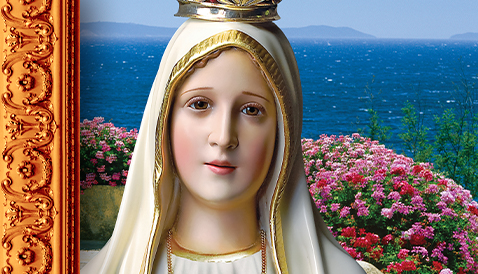

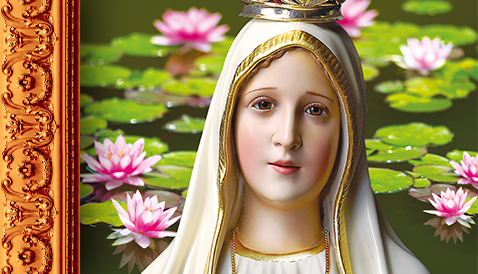

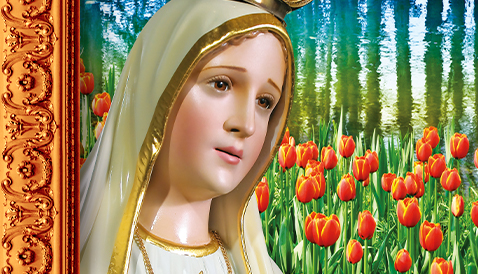


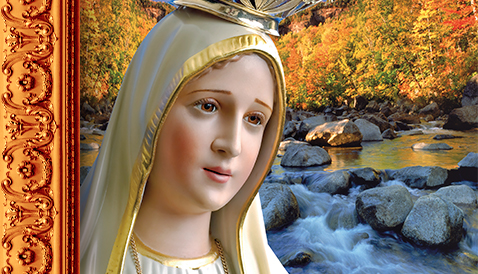

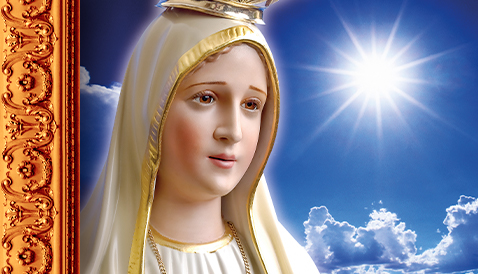


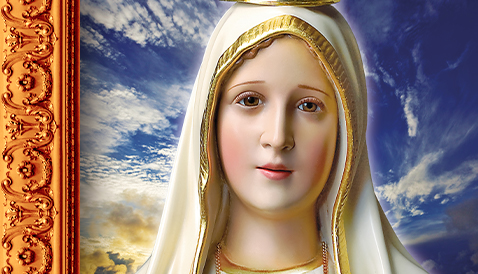

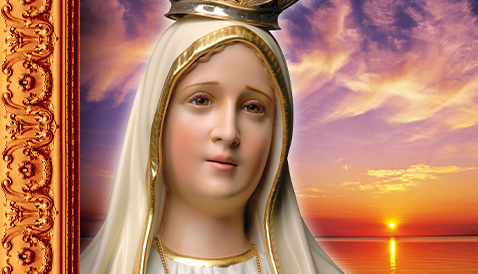
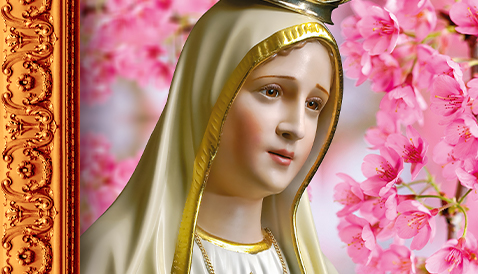
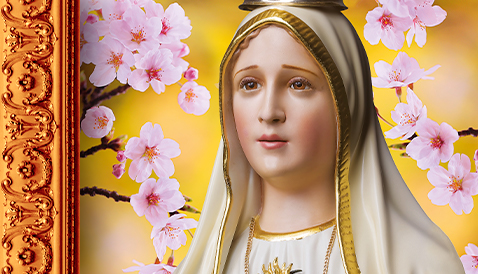






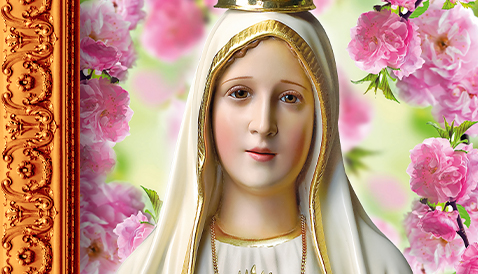
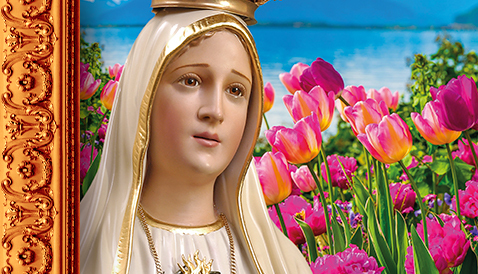


 Treatise on True Devotion
Treatise on True Devotion 